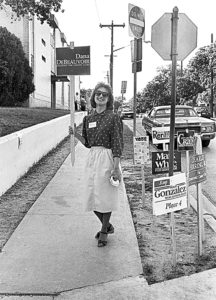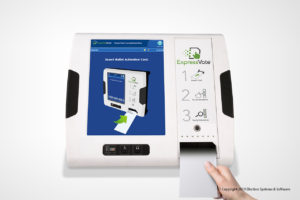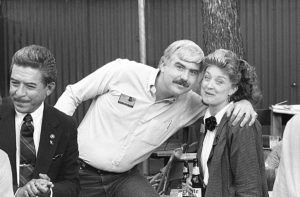Q&A with retiring county clerk Dana DeBeauvoir
Dana DeBeauvoir, Travis County Clerk for the past 35 years, announced last week that she won’t seek reelection. She plans step down before her term ends, likely at the end of January. “It’s time,” she said.
DeBeauvoir oversees elections and acts as the county’s chief custodian of public records, supervising a staff of 145, as well as hundreds of poll workers. First elected in 1986, she oversaw the digitization of massive troves of public records and spearheaded a years-long collaboration between computer scientists and election officials to make elections more secure—an effort that won national recognition.
Travis County currently employs voting machines that combine touchscreen technology with an auditable paper trail—a method widely regarded as the gold standard for election security.
As recently as August 26, DeBeauvoir had told the Bulldog that she would seek reelection. In an interview, she reflected on election security, turnout, and public confidence in the electoral process. In a follow-up November 16, she explained why she had a change of heart about running again and elaborated on the qualities she’d like to see in her successor. We publish excerpts of those interviews below, edited for length and clarity.
DeBeauvoir, 67, said that a mix of things led to her decision, including conversations with friends and her partner, a recent illness, and a vacation that got her thinking about making a change. “I said to myself, maybe I need to start learning to live a life not on adrenaline. I had several close friends who had been pounding on me, ‘Come on, Dana, you’ve been at this long enough, you need to give yourself a break’…It kind of happened at the last minute. I had every intention of running and then all of a sudden it was like you know what, I really could make some other choices.”
After retiring from public office, she hopes to pursue other passions, including international elections monitoring.
Like most other elective offices in Texas, county clerks are chosen in partisan contests, with their party indicated on the ballot next to the candidate’s name. That has helped DeBeauvoir, a Democrat, sail to victory every four years since 1986 when she first unseated a 16-year Democratic incumbent. Yet despite the partisan nature of these elections, the position of county clerk is largely a technical one, requiring mastery of local systems and practices as well as state rules. As clerk, DeBeauvoir adopted the decidedly noncontroversial mantra, “Be competent.”
She said of her job, “It’s important to take your partisan hat off…This is not a policymaking office, this is an administrative office. It’s basically a CEO position.” The county clerk is paid a salary of $141,000 per year, according to 2020 data.

DeBeauvoir’s successor will be chosen in a primary March 1, 2022, followed by the general election November 8, 2022. In the meantime, DeBeauvoir plans to recommend that the commissioners court appoint her chief deputy Adana Hess as interim successor to serve out the remainder of her term.
One candidate had already declared for DeBeauvoir’s position before she announced her retirement. Democrat Kurt Lockhart told the Bulldog that he wants to improve voter turnout and raise poll worker wages. He is also advocating for combining the Voter Registration Division, which is in the County Tax Office, with the Elections Division in the County Clerk’s Office, into a single office under an appointed official. DeBeauvoir commented on these proposals in the Q&A published below, expressing openness to the idea of combining the functions of voter registration and elections, while rejecting the idea of an appointed elections administrator.
Let’s start by talking about turnout in our elections. How has that changed since you first took office in 1987?
The first year I took office was the first year Texas implemented early voting. I embraced it and I thought it was fabulous and we immediately started finding ways to help make it even better. So Travis County was among the very first to turn early voting into retail early voting. We had voting at the mall, for example. So we’ve always looked at ways to make access to the ballot box as easy and convenient for people as possible.
I really have always pushed for a big turnout in Travis County, and Travis County has pretty much every November election beat the pants off of every other county in the state. In 2007 and 2008 the secretary of state at the time, Roger Williams, gave out an award called the Steven F. Austin Championship Award for best turnout among the counties for November elections. Travis County won it both years for highest turnout, and after that the secretary discontinued it because Travis County’s always going to win it. So we’ve always just done well in terms of turnout. This is a smart community, they pay attention, they read their mail, they care.
What have you done to make voting more accessible?
Travis County has used extra voting hours and countywide vote centers since 2011. We were one of the very first counties in Texas to do that. And vote centers have been the most helpful for voters in terms of making sure that they can have access to the polls. Countywide vote centers mean that no matter where you live in the county, or wherever you are on any given day, you can vote anywhere you see a ‘Vote Here’ sign. You can just go right in and vote, and they’ll have your home ballot ready for you there.
What steps have you taken to make elections more secure?
Travis County has been a leader nationally in exploring ways to protect the security of the ballot box and foster voter confidence in the integrity and the outcome of the elections.
My attitude has always been that any business model, any computer, can be disrupted or interfered with. If you want to use the term ‘hacked’ you can do that, though I think that’s an inartful term because there’s everything from being thrown on the floor and broken, to stolen, to more high-level infiltration. And we have to be prepared for any and all of it.
Regular paper ballots are extremely vulnerable to theft, to fire, to people scribbling all over them, or to people just trying to make extra marks on them that would cancel out the marks on the ballots. So, having lots of people watching over shoulders was the important protection and mitigation used for paper ballots.
During my time as clerk we’ve also used punch cards, optical scans, DRE (direct-recording electronic voting), and now we have paper trail. There’s lots of different ways to conduct elections and each one of those methods carries its own level of detail, its own risks, and its own mitigators.
Could you tell me more about the voting machines currently in use?
The current paper trail voting machines look a whole lot like STAR-Vote, which I spent years developing with a group of computer security and statistical folks. The community of vendors paid attention to what we developed. And what Star Vote was all about was that we’d like to have open source software that allows voters to mark their own ballot and verify it in a way that is not scribbly—what you would call an ambiguous mark—and is counted in a way that a third party can come in and verify.

That’s done through a mathematical process of auditing. I can get very technical but the easiest thing to do is read the WIRED magazine article about how we developed STAR-Vote.
We’re very happy with the machines. With the expense and the level of training that is needed to implement any new voting system, you only get to buy a new voting system once every 15 or 20 years. So this is it for a while.
What would you say to somebody who believes that an election official such as yourself could tamper with the results? What safeguards are in place to prevent that from happening?
First of all, in any business—take banking, for example—no one person is allowed to do a whole bunch of tasks. Tasks are split up and done by different teams of people. That kind of separation of duties is commonplace and is found in all election offices that are big enough.
It’s practiced in a way that allows you to assign certain tasks to certain individuals and then when they complete their tasks the next stage of the work gets passed to somebody else. The basic rule is no one person ever does any one job. It’s always at least two people so you always have somebody watching over your back.
There are air gaps between computers in the offices. I do not allow anybody to bring in any removable media to put into the computers—no games, no extra software, no downloads, none of that is ever allowed in the computers in the Elections Division. That’s a fireable offense if you do that and we have ways of checking to make sure everything’s clean, and those kinds of audits are done before, during, and after our elections.
Additionally, personally I don’t have access to the vaults where the actual paper ballots and the electronic versions of those copies are kept. I don’t know the combinations and never have. Only certain people are allowed to get into those, and they are under security cameras and vault locks.
Thanks for explaining that. What do you think of the proposal to merge the election functions in the clerk’s office with the voter registration functions in the tax office?

Travis County Tax-Assessor-Collector Bruce Elfant and I have talked about this for years. He loves voter registration, and it functions pretty well with the two of us cooperating together, so I have never made any kind of a power grab or anything like that against Bruce. But the truth is it would be a better arrangement if the two offices were together.
On the other hand, what I think is a terrible idea is to take these jobs away from both of the independently elected officials and place it under one appointed official. One of the good things about being county clerk is that I can have a spine, I can stand up to the legislature, I can have the voters’ best interest at heart at all times and I’m not going to be threatened or fired because I stood up for voters, whereas an appointed official is governed by a five-person board. Those elections administrators get told to sit down and shut up all the time and they’re fired often if they say anything that displeases their board.
A candidate for your position is campaigning on a pledge to raise poll worker pay to $15 per hour. What do you think of that idea?
I’ve been in commissioners court almost every year asking for increases in pay. And I have to say that Travis County have done a good job paying people as much as their budget will allow. But it’s not just up to Travis County—it’s a whole bunch of jurisdictions involved, and everybody has to agree to the budget increase. When the local jurisdictions conduct elections—the City of Austin and AISD and ACC, for example—they pay for it. All of the jurisdictions together pay something like $12 to $14 depending on what your job assignment is. But the state is still stuck at $7.25. So they’re the ones that need to get their act together and improve poll worker pay. The state has just been notoriously stingy about increasing the pay for their own primary election workers.
Let me ask you about the political environment more broadly. After the 2020 election, we obviously went through a very contentious post-election season. Do you think we’re in a downward spiral in terms of public trust or was 2020 kind of a one-off?
I think once we got the paper trail we were moving back toward having better voter confidence. But the social media misinformation campaigns have not served voters well. I think they have hurt voters and likewise their confidence. A lot of voters are beginning to catch on to the fact that you can’t trust what’s on social media. They’re figuring out that they’ve been handed a lot of malarkey and a lot of baloney.
So I think we’re getting a smarter electorate, I think we’re going to have to all live through the consequences and the fallout from the 2020 election, but I don’t see it as an insurmountable thing, especially if voters keep their paper trail and pay attention to it. That’s their big safety point in making sure that however it is they voted goes into the ballot box the way they wanted. I think that’s going to go a long way to getting us past this moment.

There have been reports that some county clerks elsewhere have faced harassment from 2020 election skeptics, driving them out of office. Was that a factor at all in your decision to step down?
It is absolutely a concern nationally. It wasn’t for me. This attack on elections administrators is very concerning and we need for voters and everybody else to stand up and defend them. So I am concerned about that—but no, nobody ran me out of town.
What qualities do you hope to see in your successor?
This is not a policymaking office—this is an administrative office that is basically a CEO position. So we need somebody who’s very smart and very competent. Everybody focuses on elections but this office is so much bigger and more complex. All the businesses in Travis County have to be able to count on the county clerk to keep this office functioning smoothly and to streamline procedures—the title companies, attorneys, bankers, mortgage companies.
We need somebody who’s overseen an agency possibly, overseen a large budget—that would be very helpful—somebody who has skills and experience with public relations so that they’re good at talking to the public, somebody who knows multiple areas of public service. And knowing something about courts would be very helpful.
What will you miss most about your job as county clerk?
All the people that I’ve been working with all these years.
In elections you have to take off your political hat and serve everybody. So that was one of the great things about it is I’ve worked with folks across the spectrum all these years, and that’s something I’ll miss. Getting to see everybody and talk to everybody from all walks of life—what they need, what they want to be able to participate in an election.
 Trust indicators: Bulldog reporter Daniel Van Oudenaren is a journalist with 12 years experience in local, state, and international reporting.
Trust indicators: Bulldog reporter Daniel Van Oudenaren is a journalist with 12 years experience in local, state, and international reporting.







